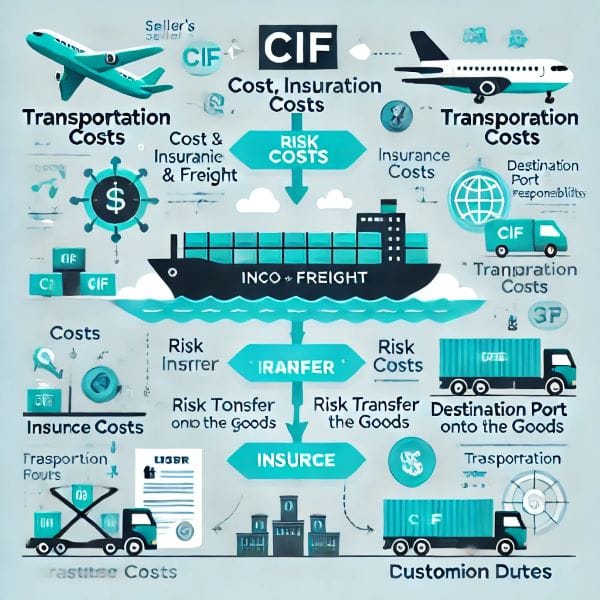In international trade, CIF (Cost, Insurance, and Freight) is a common trade term and is part of the Incoterms formulated by the International Chamber of Commerce (ICC). This article will introduce this trade term in detail.
Learn more below: The 11 Common International Trade Terms

Definition and Overview of CIF
CIF means that the seller is responsible for the transportation costs of the goods from the port of departure to the port of destination, including transportation costs and insurance costs required during transportation. According to the CIF terms, the seller must fulfill the following obligations:
- Deliver the goods to the designated means of transport (usually a ship) and bear the transportation costs.
- Purchase transportation insurance for the goods and bear the corresponding costs.
- Provide the required transportation documents and insurance documents so that the buyer can complete the pickup and cargo claims.
Composition of CIF Terms
CIF terms contain the following key parts:
- Cost: The seller must bear the transportation costs of the goods from the port of departure to the port of destination until the goods are delivered to the port of destination.
- Insurance: The seller must insure the goods in transit to protect the buyer from possible losses during transportation.
- Freight: The seller is responsible for paying the transportation costs of the goods from the port of departure to the port of destination.
Seller’s Responsibilities
Under CIF terms, the seller’s responsibilities include:
- Purchase of product export license
- Provide product inspection
- Any costs or expenses for transporting and loading the goods to the seller’s port
- Cost of packaging goods for export
- Customs clearance fees, duties and taxes (export)
- Cost of transporting the goods from the seller’s port to the buyer’s port of destination by sea or water
- Cost of insurance for transporting the goods to the buyer’s port of destination
- Cost of damage or destruction of the goods
- The seller must deliver the goods to the vessel within the agreed time and provide proof of delivery and shipment.
Buyer’s Responsibilities
Once the goods arrive at the buyer’s port of destination, the buyer will be responsible for the costs associated with importing and delivering the goods. These costs include the following:
- Unloading the goods at the port terminal
- Transferring the products within the terminal and transporting them to the delivery location
- Duty fees and costs associated with importing goods
- Cost of transporting, unloading and delivering the goods to the final destination
Advantages and Challenges of CIF
Advantages:
- The seller guarantees transportation safety: The seller assumes insurance liability, and the buyer can enjoy protection during transportation and avoid risks caused by transportation losses.
- Simplify buyer operations: The buyer does not need to arrange transportation and insurance matters, reducing the management burden.
- Transparent costs: The buyer can understand the transportation costs and insurance costs in advance, which is convenient for budgeting and planning.
Challenges:
- Buyer risk: The risk of the goods is transferred to the buyer at the time of loading, which may cause the buyer to face unforeseen risks during transportation.
- Incomplete insurance: The insurance provided by the seller may not fully meet the buyer’s needs, especially in the transportation of high-value goods.
- Inadequate cost control: The buyer cannot directly choose the transportation company or insurance company and may face high transportation and insurance costs.
Comparison between CIF and Other International Trade Terms
There are certain differences between CIF and other international trade terms (such as FOB, CFR, EXW, etc.):
- FOB (Free on Board): The seller completes the delivery after the goods are delivered to the ship, and the buyer bears the transportation and insurance costs. Under CIF terms, the seller needs to pay the freight and insurance.
- CFR (Cost and Freight): The seller is responsible for paying the transportation costs, but does not include insurance costs, and the risk is transferred to the buyer when loading.
- EXW (Ex Works): The seller only needs to deliver the goods to the designated location, and the buyer is responsible for all transportation, insurance and other costs.

Applicable scenarios of CIF in International Trade
CIF terms are usually applicable to situations such as sea or inland shipping, especially when the buyer and seller are located in different countries and regions. CIF is widely used in the following scenarios:
- Commodity trade: international transactions of commodities such as coal, ore, and oil.
- Manufacturing and retail industries: When products are transported from the exporting country to the importing country, CIF terms can better ensure the safety of goods during transportation.
- Long-term cooperative buyer-seller relationship: When the two parties have a stable long-term cooperative relationship, CIF terms facilitate the joint management of transportation and risks.
CIF terms are an important transportation and insurance arrangement in international trade, suitable for situations where both the seller and the buyer want to simplify transportation and cost management. Buyers and sellers should make reasonable decisions based on specific trade needs, transportation methods, risk control and other factors.
